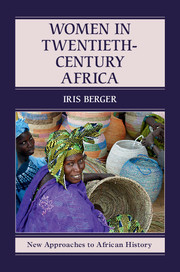Book contents
- Frontmatter
- Dedication
- Contents
- LIST OF ILLUSTRATIONS
- LIST OF MAPS
- PREFACE
- Map
- Introduction
- 1 Colonizing African families
- 2 Confrontation and adaptation
- 3 Domesticity and modernization
- 4 Mothers of nationalism
- 5 The struggle continues
- 6 “Messengers of a new design”: marriage, family, and sexuality
- 7 Women's rights: the second decolonization?
- 8 Empowerment and inequality in a new global age
- Contradictions and challenges
- REFERENCES AND FURTHER READING
- INDEX
5 - The struggle continues
Published online by Cambridge University Press: 05 May 2016
- Frontmatter
- Dedication
- Contents
- LIST OF ILLUSTRATIONS
- LIST OF MAPS
- PREFACE
- Map
- Introduction
- 1 Colonizing African families
- 2 Confrontation and adaptation
- 3 Domesticity and modernization
- 4 Mothers of nationalism
- 5 The struggle continues
- 6 “Messengers of a new design”: marriage, family, and sexuality
- 7 Women's rights: the second decolonization?
- 8 Empowerment and inequality in a new global age
- Contradictions and challenges
- REFERENCES AND FURTHER READING
- INDEX
Summary
In 1960, three years before Kenyan nationalists declared victory in their struggle for independence, a young Kikuyu woman, Wangari Maathai, was among a small group of students selected to study at American universities. The committee had chosen well. After earning her BA at Mount St Scholastica College in Atchison, Kansas Maathai went on to earn a master's degree in biology at the University of Pittsburgh. In 1971, she became the first east or central African woman to receive a PhD – a degree in anatomy from the University of Nairobi (then the University College of Nairobi). Her education launched her on a stellar career as a university professor; the founder of a pioneering environmental group, the Green Belt Movement; and, in 2004, the first African woman to win the Nobel Peace Prize.
But the struggles Maathai faced when she returned to Kenya in 1966 reflected the experience of many women in the postindependence decades. In her autobiography, she wrote of her six years in America:
The United States prepared me to be confident … to critique what was happening at home, including what women were experiencing. My years in the United States overlapped with the beginnings of the women's movement and even though many women were still bound to traditional ideas about themselves at that time, I came to see that as an African woman I was perhaps even more constrained in what I could do or think, or even hope for. This was to come into sharper perspective when I returned to Kenya in 1966, thinking the sky was the limit for me.
Instead of limitless opportunities, Maathai confronted innumerable professional and personal challenges. As a faculty member in the School of Veterinary Medicine at the University of Nairobi, she discovered that married women were denied the full housing, health insurance, and pension benefits of their male colleagues. She also realized the cultural disadvantages of her education, the “unspoken problem” as she put it, “that I and not my husband had a Ph.D. and taught in the university.” When her husband, a Member of Parliament, suddenly left her and sued for divorce, he justified his actions during the contentious, highly publicized trial by describing Maathai as “too educated, too strong, too successful, too stubborn, and too hard to control.”
- Type
- Chapter
- Information
- Women in Twentieth-Century Africa , pp. 89 - 120Publisher: Cambridge University PressPrint publication year: 2016



